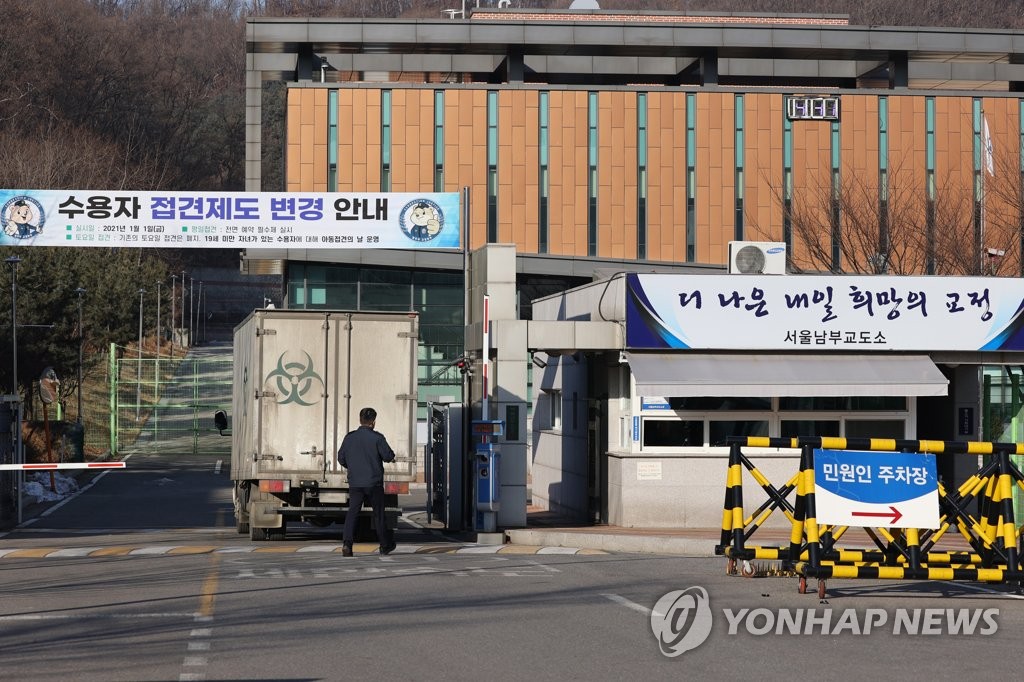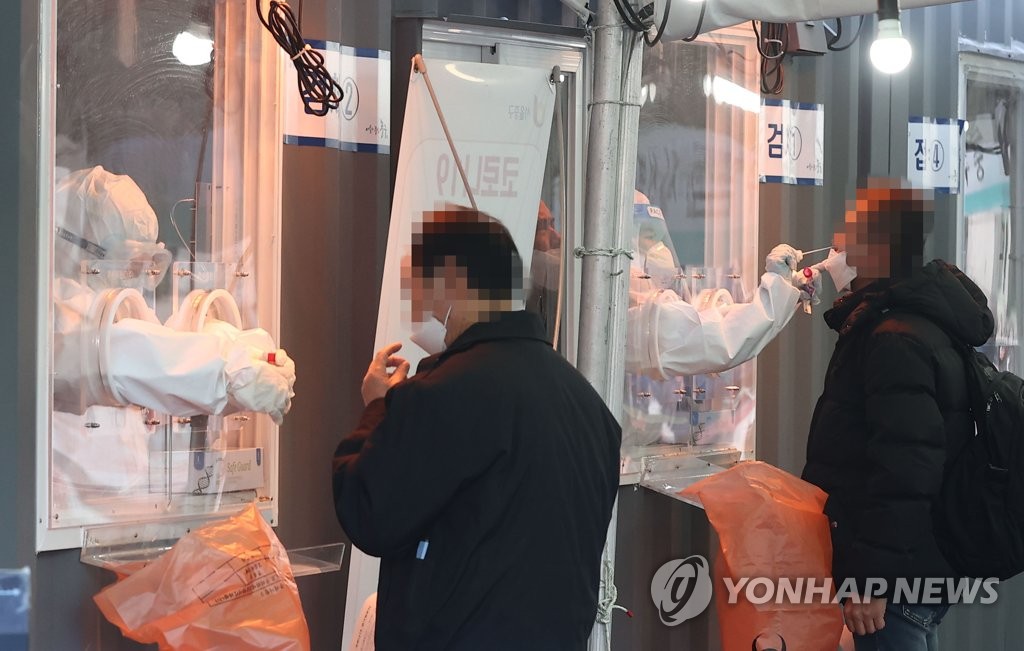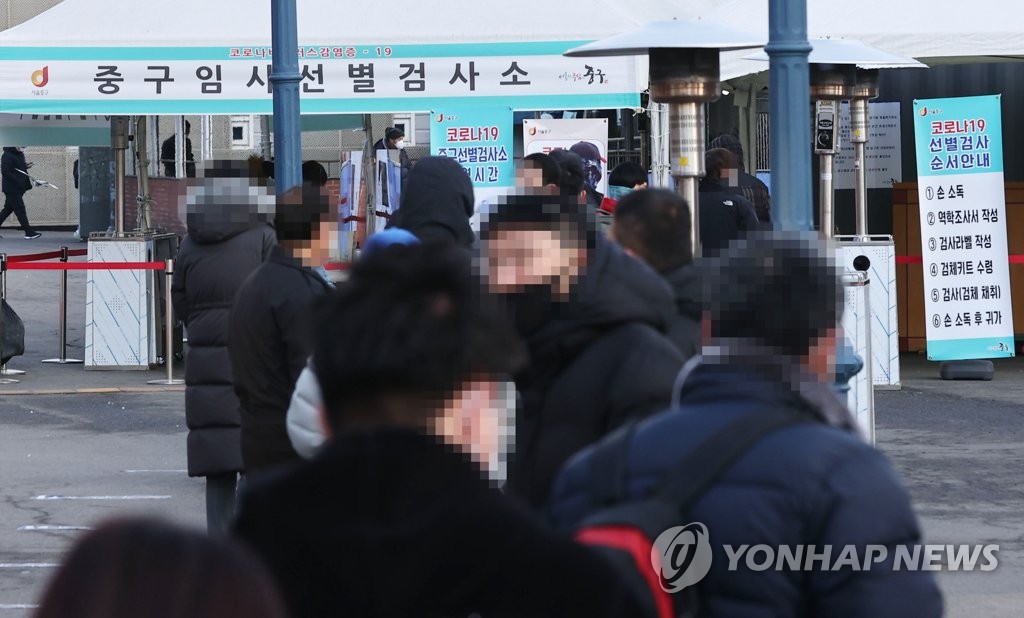(LEAD) coronavirus-additional cases
 |
| ▲ This photo taken on Feb. 3, 2021, shows a vehicle carrying medical waste entering the Nambu Correctional Institution in southwestern Seoul, where nine inmates tested positive for COVID-19. (Yonhap) |
 |
| ▲ This photo taken on Feb. 3, 2021, shows people receiving a coronavirus test at a medical facility at Seoul Station in central Seoul. (Yonhap) |
 |
| ▲ This photo taken on Feb. 3, 2021, shows people lined up for a coronavirus test at a COVID-19 testing facility in Seoul Station. (Yonhap) |
(LEAD) coronavirus-additional cases
(LEAD) New virus cases over 400 again on pileup of cluster infections
(ATTN: CHANGES photos; ADDS details throughout)
SEOUL, Feb. 3 (Yonhap) -- South Korea's daily new coronavirus cases bounced back to over 400 after four days on Wednesday as cluster infections continue to rise despite extended virus curbs.
The country added 467 more COVID-19 cases, including 433 local infections, raising the total caseload to 79,311, according to the Korea Disease Control and Prevention Agency (KDCA). The daily caseload rebounded after staying under 400 for the past three days.
The rebound comes after health authorities extended tough social distancing measures by another two weeks until Feb. 14.
Daily infections have been slowing down since the third wave of the pandemic peaked at a record high of 1,241 on Dec. 25.
But the daily cases recently spiked due mainly to cluster infections involving correctional facilities and unauthorized education facilities run by a local Christian missionary group, called the International Mission (IM).
Another cluster infection appeared to have emerged Tuesday at the Nambu Correctional Institution in southwestern Seoul, with nine inmates who worked in the kitchen testing positive.
As of noon Tuesday, cases tied to IM education facilities came to 385, up one from the previous day. Infections traced to a general hospital in eastern Seoul rose five over the past 24 hours to 52. Patients linked to two chicken processing companies in Chungju, North Chungcheong Province, reached 40, up two from a day earlier.
Amid a flare-up in virus cases, the KDCA on Sunday extended Level 2.5 social distancing rules, the second highest in a five-tier scheme, in the greater Seoul area and Level 2 measures in other regions for two weeks to come.
Under the extended rules, gatherings of five or more people are also banned almost across the entire country.
Authorities believe relaxing the curbs runs the risk of an uptick as cluster infections have continued to pop up at religious facilities, hospitals and other risk-prone establishments.
While fully mindful of a potential uptick in virus cases tied to clusters and new virus variants, health authorities signaled that the country's virus restrictions may be eased before the Lunar New Year holiday that starts later next week.
Of the newly identified local infections, 184 cases were reported in Seoul and 107 cases in Gyeonggi Province that surrounds the capital. Incheon, 40 kilometers west of Seoul, reported 18 more cases.
South Chungcheong Province reported 35 more virus cases and the southern port city of Busan added 18 more cases.
The country added 34 imported cases, increasing the total to 6,403. Fifteen cases came from Europe, followed by eight cases from Asian countries except for China, five from the United States and three from Africa.
The country added six more deaths, raising the total to 1,441. The fatality rate was 1.82 percent.
The number of seriously or critically ill COVID-19 patients reached 220, down from 224 a day earlier.
The total number of people released from quarantine after making full recoveries stood at 69,299, up 524 from the previous day.
The country has carried out 5,756,714 coronavirus tests since Jan. 3, 2020. The country reported its first case on Jan. 20 last year.
Meanwhile, South Korea has extended the ban on passenger flights arriving from Britain, which has been in place since Dec. 23, until Feb. 11 to block the new virus variant that was first identified in Britain.
All foreign entrants are required to present papers showing negative polymerase chain reaction (PCR) tests taken within 72 hours of their departure to the nation.
The pandemic, which started in China in late 2019, has killed nearly 2.3 million people worldwide and infected more than 103 million as of Feb. 1, 2021, according to a tally from Johns Hopkins University.
(END)
(C) Yonhap News Agency. All Rights Reserved

























![[2026 Outlook] BTS, BLACKPINK comebacks; UNESCO World Heritage session in Busan fuel K-culture momentum](/news/data/20251226/p1065576816972067_337_h.jpg)











